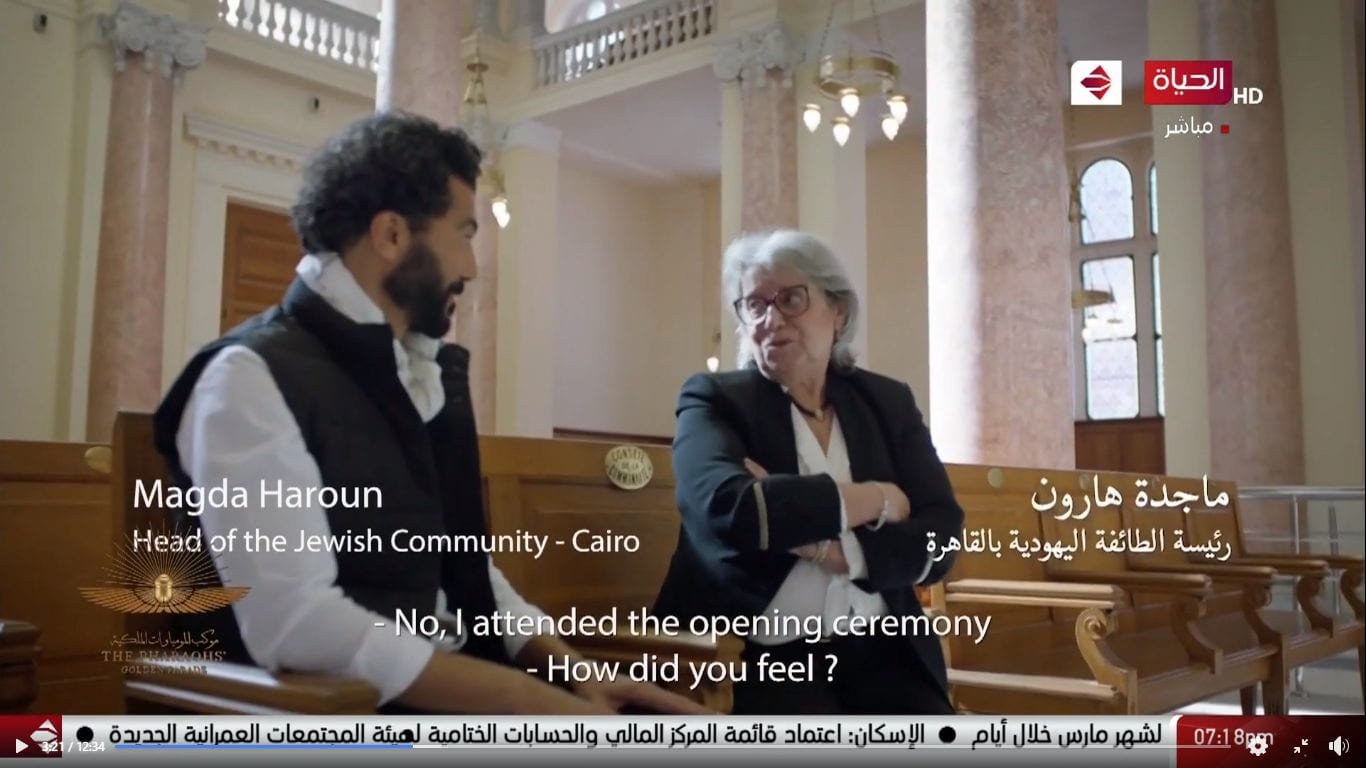The parade was grand, empowering; we loved it. We can take ages to pinpoint our favorite things about the celebration, and we will, but we feel like we need to start with the most powerful yet overlooked moment of the parade: the apperance of Magda Haroun.
For those who are not familiar with who Haroun is, in short, she’s a hero. But in more detail, Haroun is head of the Jewish community in Egypt, and she claims that she will be the last Jew left in Egypt, and it’s shaping to be true.
Haroun was featured in the film to comment about the LE65 million restoration of Eliyahu Hanavi Synagogue in Alexandria on January 10, 2020.
The synagogue’s development portrays the tourism and Antiquities Ministry’s dedication to the Jewish heritage just like other Egyptian inheritances; archaeological expert Abdel-Rahim Rayhan told MENA.
About Magda Haroun:
Knowing that she’s probably going to be the last Jew in Egypt, Haroun has made it her mission to preserve Egyptian Jewish culture’s remnants. She claims that it became an obsession for her.
She has a reason to become obsessed, though, since many are not aware of the presence of almost 80,000 Jews during the 20th century and all the history that’s been left behind.
While several Jewish families in Egypt fled, by choice or not, since 1948, Magda’s father, Shehata Haroun, refused to emigrate outside Egypt. According to Shehata, Cairo was the precious rock that he would not give up for pearls.
Most Jews fled Egypt due to attacks on the community during and after the 1956 war when Israel invaded the Sinai Peninsula to regain control of the Suez Canal.
The exodus began after establishing the State of Israel in 1948 and the first war between Israel and its Arab neighbors. Jews were also prominent in the Egyptian Communist Party, which was outlawed under President Gamal Abdel Nasser in 1958.
According to an interview made with Magda Haroun by Al Masry El Youm where she was speaking about her father:
Patriotism was not just his right, but a duty too, he would say. Shehata Haroun paid dearly by sticking to his principles.
His freedom, security, and stability were all compromised by staying in Egypt.
As a result, his two daughters suffered.
He even stayed in Egypt rather than accompany his eldest daughter Mona on a medical trip from which he might not have been able to return.
When Haroun died, Magda invited a French Rabbi to perform the funerary rites before his burial, rejecting one from the Israeli embassy.
Her decision was a continuation of her father’s struggle against Zionism, which he saw as a racist movement. Like her father, Magda refuses to emigrate overseas.
Haroun was previously married to a Muslim man, with whom she had two Muslim daughters, and is now married to a Catholic man.
Magda’s apperance in the film is a massive win for the tiny Jewish community in Egypt, and it’s powerful for all of us.
Our article is just a tiny glimpse of Haroun and her family, but we genuinely recommend reading more about her work for the Jewish community. Haroun is a symbol of strength, persistency, and power. She’s a woman for us to look up to, and I couldn’t be happier to see her in the film.
The film was directed by Tamer Ashry, stars Khaled El-Nabawy, and was in cooperation with the Ministry of Tourism and Antiquities under His Excellency the Minister Dr. Khaled Al-Anani.









What do you think?
It is nice to know your opinion. Leave a comment.